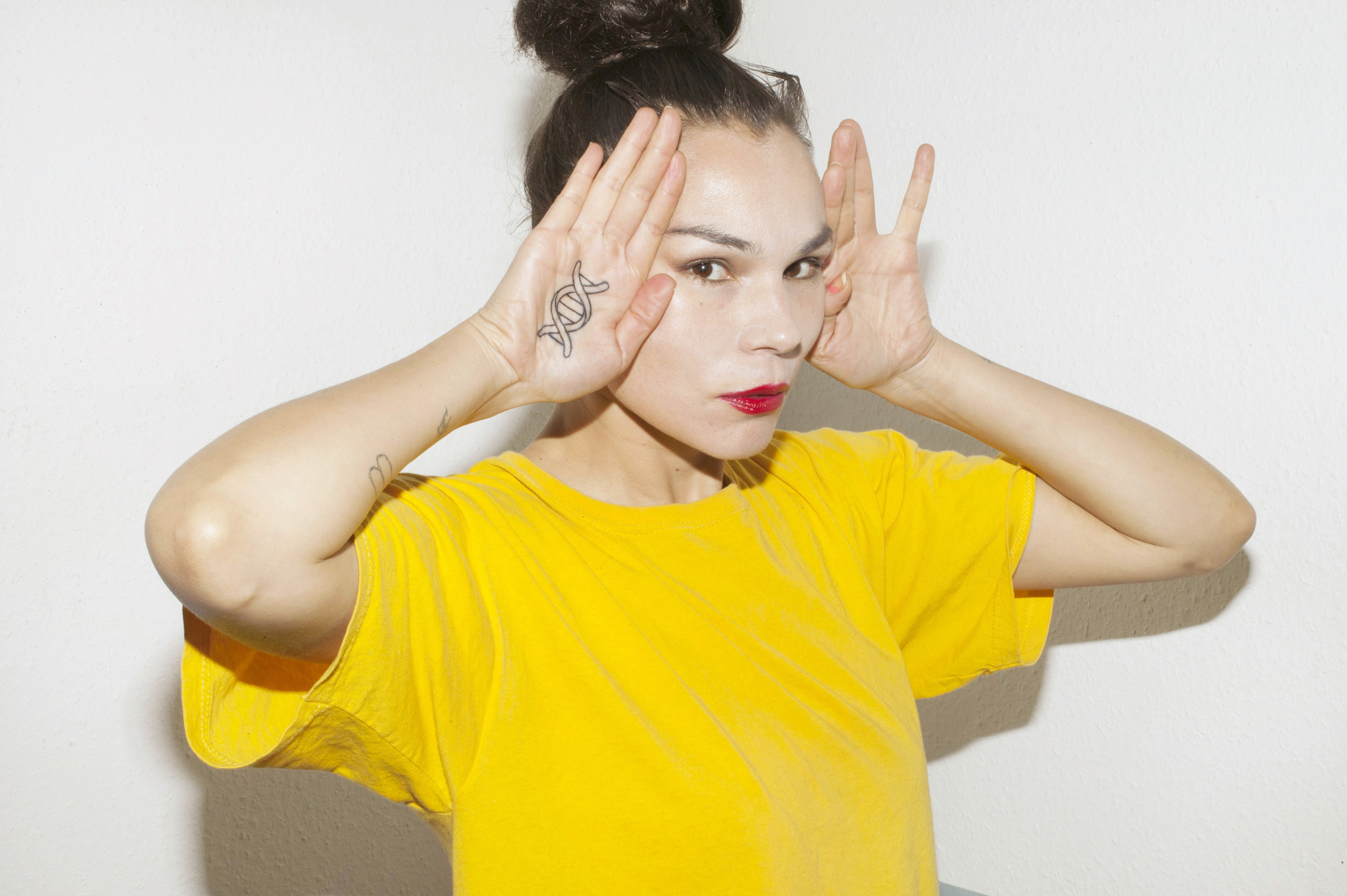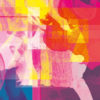Photography EMILE BARRET
While industrial music and Michael Jackson both helped Aïsha Devi embrace the part of her personality that always felt alien—existing just outside the self-imposed rules of society—the Danse Noire co-founder didn’t find her tribe until she went to art school. That’s when she witnessed a particularly moving show featuring Pan Sonic and Autechre.
“This was a different kind of music,” explains Devi, “dealing with body parts and bones, not the ego. I almost felt like I had to puke there; the subs were that strong.”
Many people have had similar reactions to the singer/producer’s own sets: trance-inducing, audiovisual affairs that wash over you and can trigger an altered state of consciousness. Lucky fans in Brooklyn and LA will be able to witness this firsthand on Wednesday and Friday, when Devi presents a special performance alongside her longtime friends Asian Dope Boys.
With all of this in mind—along with Devi’s recent DNA Feelings album on Houndstooth—we asked the Geneva native to give us a beginner’s guide to meditation, something that’s shaped her sound and ever-evolving views of the world itself….
A lot of my friends see how meditation impacts my everyday life, but they don’t know how to start themselves. They’re like, ‘Well, I’m sitting here, getting bored and frustrated.’
It was actually a long process for me. I’m not sure I was a good candidate for it at first. It started with me getting interested in guttural singing—how music and tone is very important for Tibetan monks. I started doing a mantra connected to ancient texts like the Vedas—knowledge that hasn’t been corrupted by capitalism or dogmatic religion. It’s more about the body, really; there’s a lot of medical stuff about treating yourself with music and breathing.
So I came to meditation to enhance my lung capacity for singing. Because I used Western techniques at first—bel canto, which is how sopranos are trained. It’s very egocentric, and I was very frustrated with that. So I started to sit and focus on my breathing. At first, it’s a discipline that takes a lot of effort—very boring. But it gets easier over time.
Singing liberates certain frequencies. It’s a vibration you feel throughout your body, which really helps you tune yourself with a very soft and generous state of mind. Meditation isn’t about looking at yourself meditating. You have to lose yourself in the tone and the vibration; then you can go to the origin of yourself and matter. Because matter is just an illusion. It’s just a 3D spatialization of different frequencies.
Once I meditated and did my mantra for a while, a second voice suddenly appeared, kind of like the deep Kargyraa voice you hear in Tibetan throat singing. I was like, ‘Wow, this is amazing. What is happening in my body?’
I was very sick before starting meditation. I had anorexia for 10 years; it was very brutal. And I had eczema all over my body. Two months after [starting meditation], everything was gone. It was self-healing—very natural. I felt so good. It was like, ‘Oh, meditation isn’t just a trend. It’s about finding your own tuning.’
Singing is exactly that for me—all about going back to the essence of the human condition. It’s like I’m in an altered state of consciousness.
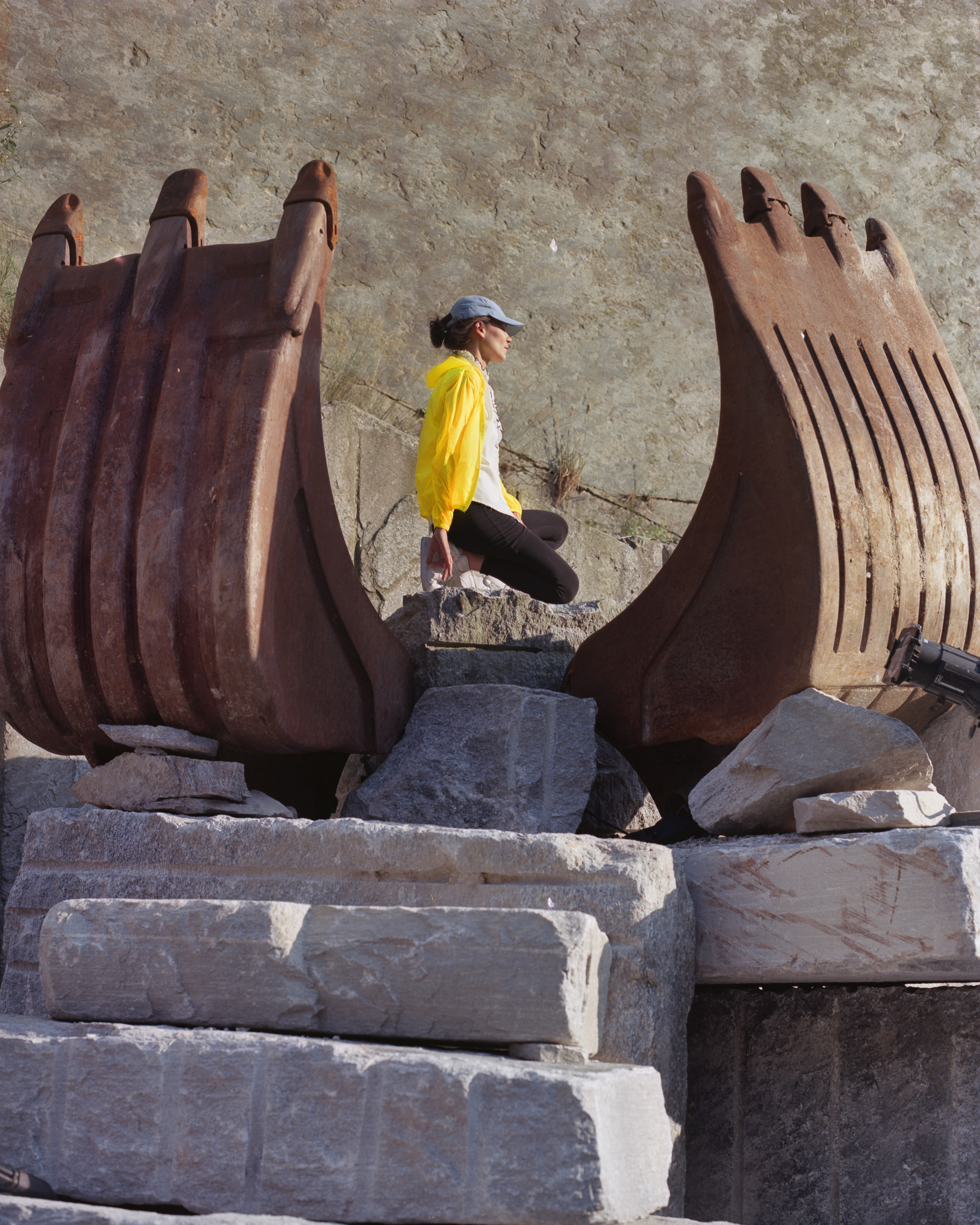
I’m working a lot with binaural beats now. Each of the frequencies are different, but they combine to make a new vibration. The Delta puts you in a very meditative state. It’s almost like a drug—like heroin or something like that. It turns your brain into an open, meditative mind like LSD. And the other frequency I’m using is the Theta. It helps regenerate cells—really holistic.
It’s about more than just feeling better in this life, though. With capitalism, we are limited to this 3D world that loves making us feel depressed and telling us we’re going to die soon. It’s about fear and guilt and consumption. Meditation is this invisible force, empowering us to live in another dimension.
I think people are so depressed because they know there’s something more than the 3D world, but they can’t always tap into it. For instance, video games help people organize another life in their mind. It’s like dreaming, and they can’t deal with the fact that these other realities don’t fit together. We have to eat; we have to work; we have to have a place in society. Meditation is the best gateway for humans to understand they’re more than just matter. It gives them hope.
With the right frequency, ritual music can open up all 11 dimensions. That’s why it’s important for musicians to go back to ancestral knowledge—the mantras that put us in an altered state of consciousness. Reconnecting helps us transcend and live in other realms. Capitalism lobotomized us to make us more productive and forget about these other realities.
I apply all of this to my music, whether I’m producing or performing live. It’s funny; the last time I did a show, some people came by afterwards and said, ‘That was crazy. I felt this massage all over my body.’ It’s because I’m using this frequency that has a big impact. That’s why I love using [subwoofers]; they’re the lowest frequency, and they move you. Subs can actually break glass; know what I mean?
I was dancing with friends at a rave once. It was 4 a.m., and I remember the frequency of the subs made a little cactus fall on the floor. I love the idea of having an impact on the body and reordering human matter. Meditation is very important for that; it opens up these gates for people to understand how the body is more than just that. That’s why I called my album DNA Feelings—because I think we can rearrange our DNA. Nothing is static.
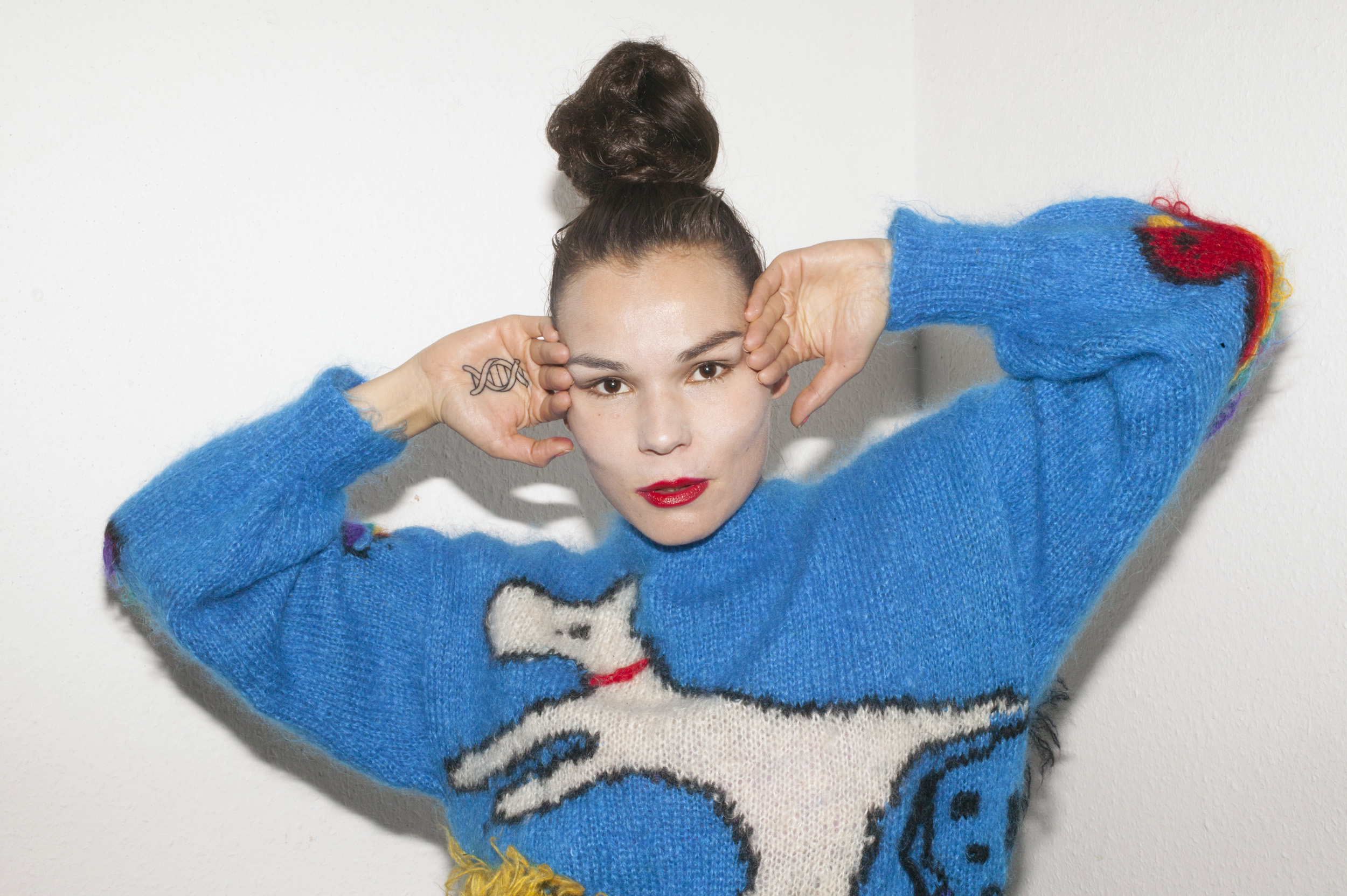
Capitalism teaches us the only option we have is to grow old, which isn’t true. I don’t believe that. When you’re about to die, you’re not going to think about your car or your house; you’re going to think about all the invisible things—the things society tends to call ‘spiritual’. Although that’s bullshit—a box you put everything you don’t understand in.
We’re in an era of so much frustration. Musicians need to be these mad men, opening doors for everyone—sabotaging capitalism and sharing alternate visions. People are looking more and more for this. They’re quitting their jobs because they aren’t willing to be little soldiers for this society anymore. It’s a good time now. People get it. Even pop music is becoming less egocentric. Like I was listening to Frank Ocean the other day and thinking, ‘Wow, even pop stars get it.’
It’s very interesting to think about how we’ve always adhered to this very compact format of a verse, a chorus, and something very ego-pleasing. Now songs are extending themselves and putting us in a kind of trance. Like I love that new generation of rappers who mumble. For me, it’s connected to the African griot and the idea of mantras. The words aren’t important; the frequencies are.
That’s saying mantras in Sanskrit is so powerful. English uses a frequency that’s all about the lips and the mouth, but Sanskrit and other languages like it are more based in the throat. The resonation is so much bigger; the way you open your thoracic cage is so different than we did in the West. It’s almost like a shamanic voice.
I like that idea—that musicians can be hi-fi shamans guiding you through space. With good intentions, of course. Frequencies can bring order to so many things. Music can make you sad or happy, but it’s not about our personal [lyrics]; it’s more about the frequencies and how they heal or reorder your body. Like one track on my new album—”Cell Stems Spa”—is supposed to make you feel younger.
The album is full of binaural frequencies like that, but it’s pretty discrete. Live is more naked, so people really understand it. It’s funny—this difference between what is music and what is entertainment and what is healing. I like to play very loud—to confront people and purge them with sound. But it’s still in the format of a collective rave gathering. I think we have that inside us as humans: to rave and lose ourselves together in an altered state of consciousness.
We called some of the music from the ’90s ‘trance’ because it was supposed to induce a similar trance-like state. I’m using a synthesizer from back then that really does work, actually. It messes with your brain; it’s like taking a drug.
There’s tons of people doing something that’s similar to me; a lot of people have that intention of providing an alternative. I’m not talking about hippies or New Age, either. It’s another consciousness—so much more than a social movement. It’s not a naive utopia anymore.
It’s not a coincidence that ambient music is a trend. There’s a call for that, because we’ve realized that Western capitalism is collapsing. So we have to find an alternative—a new language to empower people outside of the rules.
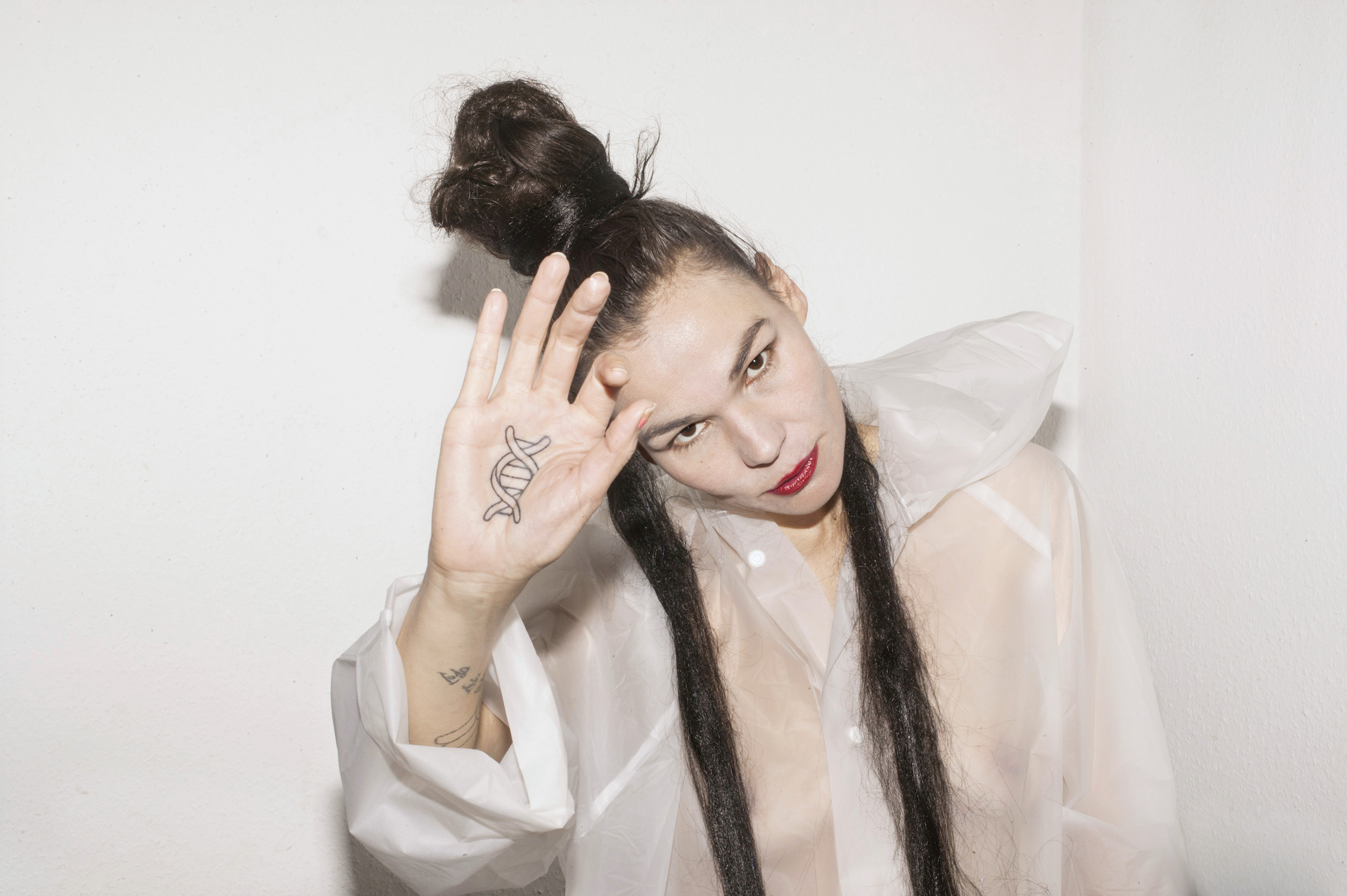
With my music, I sometimes use untuned things on purpose because the Western world often uses the diatonic scale or closed harmonies—three or four notes. Whether you like the ritualistic music of India or not, it puts you in such a meditative state.
Ravi Shankar always said he never used closed harmonies because then your brain opens. It helps you transcend the rules—what you learned at school and have been told your whole life. Non-diatonic music can put you in a meditative state quickly. Western music is more about satisfying the ego—this post-Romanticism ideal. I am the subject; I am happy; I am sad. But the ritualistic music of the Middle East, South America and Africa has this idea of transcendence.
Ambient music also uses these techniques, and it gets rid of space-time because it’s not like a four-minute track with verses and a chorus. It can be extended. When I do music, I turn my voice into a loop. I could die while vacuum cleaning and it’d still continue. It’s bigger than me. Ambient is about that—about opening the gates and showing that we are bigger than the establishment. Space-time and 3D is obsolete now.
There wasn’t a precise moment where I started to look at the world this way. I grew up with my grandmother and always felt like an outcast. Always being alone made me invent my own cosmos—a place where I’d feel better than the real world. I always sought other realities.
Many people are submissive to the system that makes them feel happy and have money. I was never satisfied with what was put in front of me on TV. I hated school; I hated racist teachers. Being different meant that I really suffered. I tried to conform, but it didn’t really work. The first time I felt like I found my place was in art school. It helped me realize there was an alternative path to what you see on TV. That opened the door to a life of experimentation. It also brought me to meditation.
The first 20 years of my life felt especially isolating, because I grew up in a suburb of Geneva surrounded by older, rich people who are really materialistic and have no questions about life. Like one of my neighbors was the old FIFA president, Sepp Blatter.
I didn’t feel like I belonged to that. Nature really opened the gate for me. I’d sneak out and try to connect with the cosmos.
Traveling with my grandmother also helped open my mind. It helped me realize how suffering is all over the world. I didn’t want to be this imperialistic, European kid. I always wanted to truly understand wherever I was.
When I started to go to India, I was already out of art school and touring. It kind of brought me closer to my roots, not because I wanted to find who I was. More because I felt like knowledge was more interesting there than Western academic knowledge. I had amazing answers. I still haven’t been to Nepal, where my father is from, but it’ll happen.
It’s weird now; younger people have a different brain because of the internet. They aren’t confined to one location. Now everything is mobile. I love the idea of people losing their office jobs and contributing on a global scale. The ability to create something with your hands is so powerful and not so abstract.
But I’m not a hippie. And I don’t want to belong to any kind of cult or dogmatic religion. I prefer to talk about spirituality and the energetic world outside of religion. Jesus, Buddha and Shiva were all enlightened. There’s so much common knowledge in every religion, but humans corrupted it and used it for power. I’m more interested in the basic ideas within them. Like atoms were already mentioned in the Vedas—thousands of years before this era.
I really believe this life is just a physical manifestation of our eternity. Believe it or not, but that’s how I feel. I like the idea of life being an experiment. It’s interesting to grow and get stimulated by many different ideas and forms of stimulation.
I put that into the music and never think, ‘Oh, that was my best album.’ My main goal is to impact people. I’ve always loved the idea of nightlife. It’s not good or bad; it’s your own awakening.
